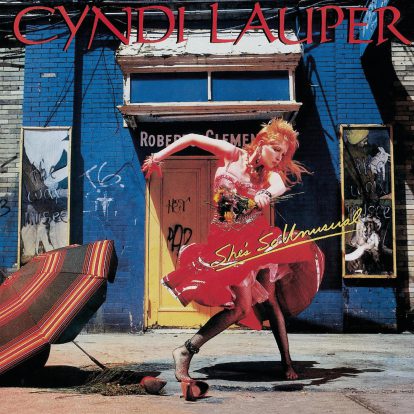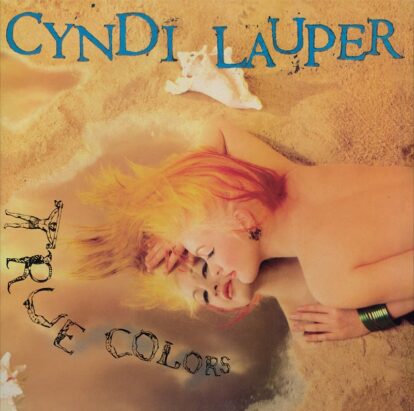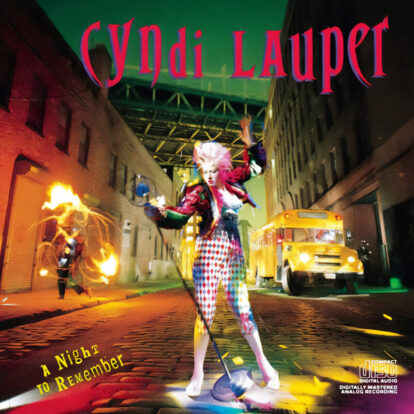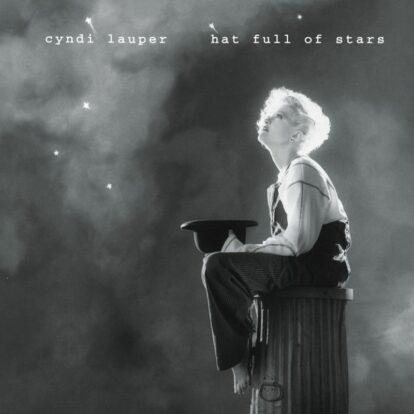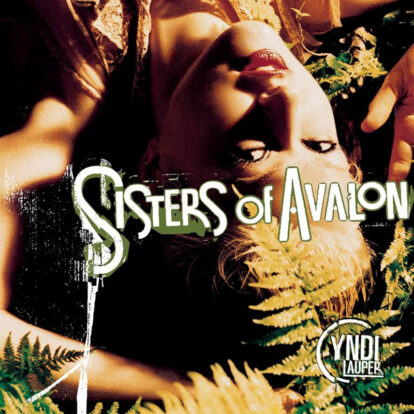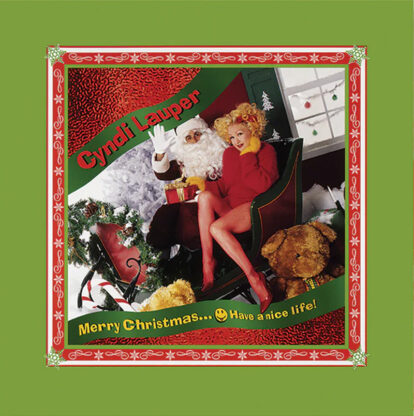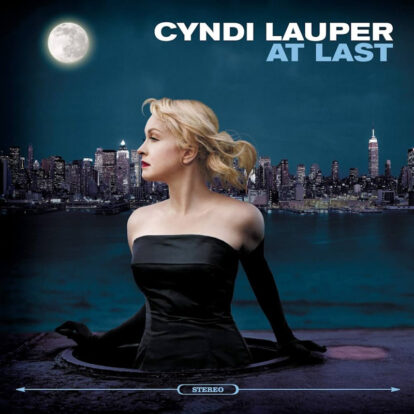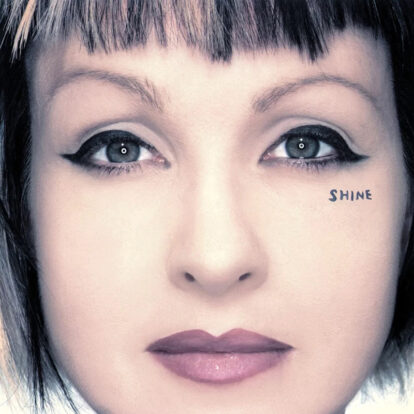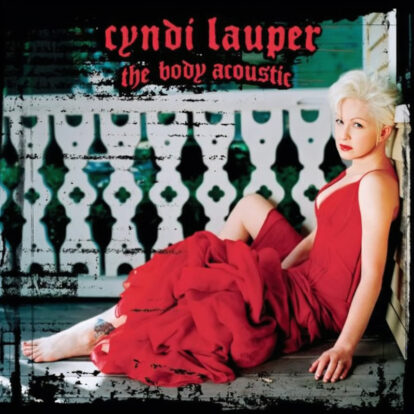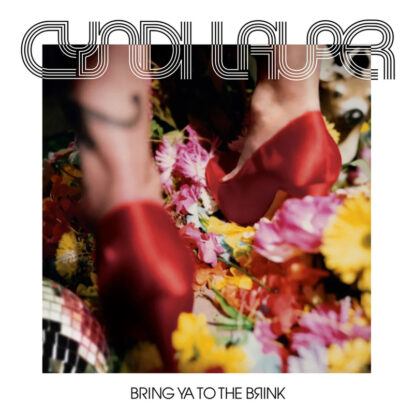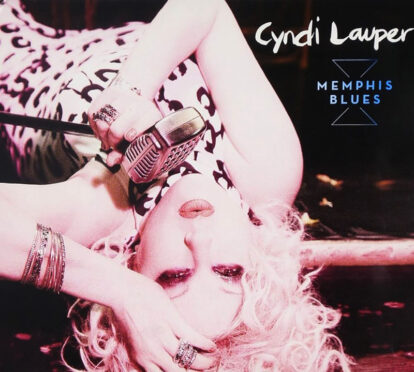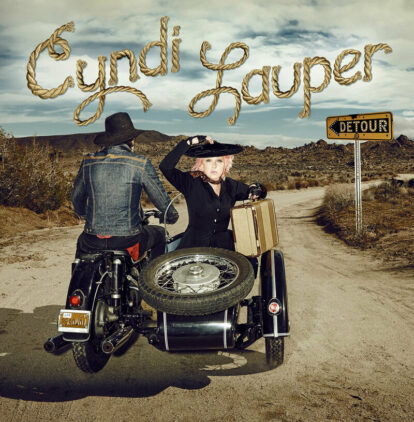An in-depth look at the genre-hopping career of pop pioneer Cyndi Lauper
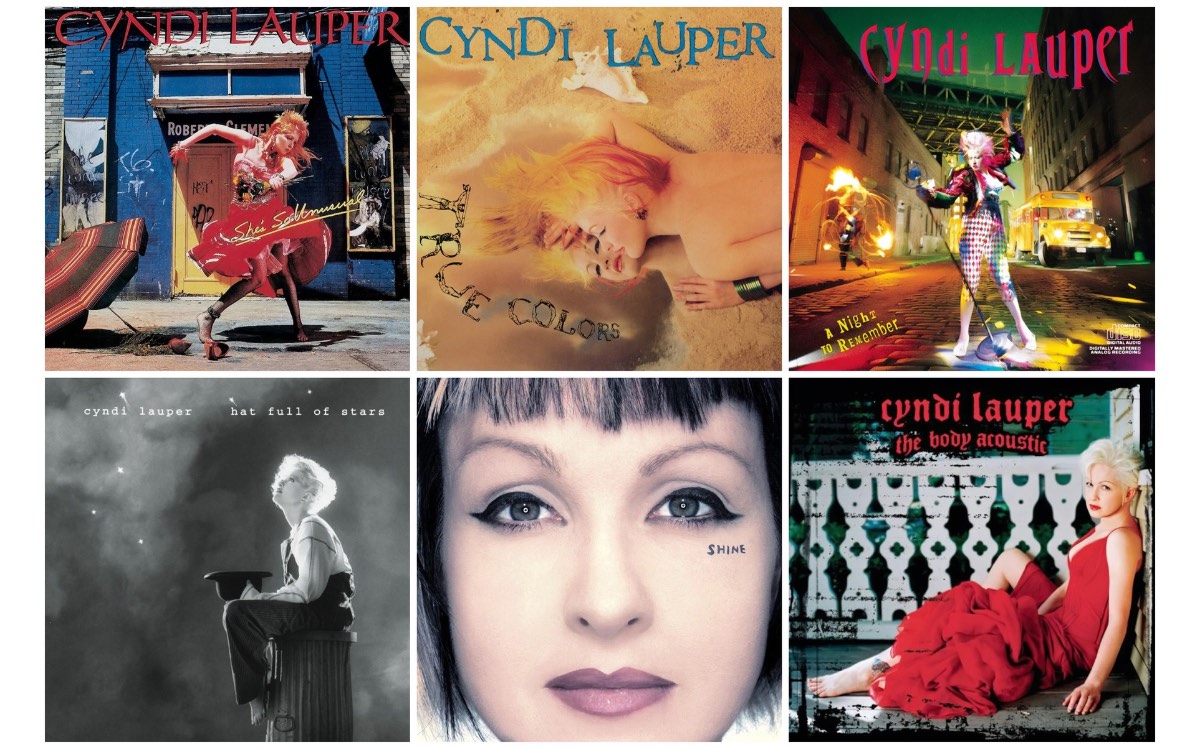
With her neon hair, rebellious style, and powerhouse voice, Cyndi Lauper burst onto the 80s music scene proving that girls really just wanna have fun – and make history doing it. We look back on the genre-hopping career of one of MTV’s first megastars who has skipped from pop to jazz, blues and country…
She’s So Unusual (1983)
After stints in various cover bands, a failed attempt to hit the big time with New York power pop outfit Blue Angel (it “went lead,” she later joked to Time magazine about their sole major label release) and a management lawsuit which forced her into bankruptcy, a young Cyndi Lauper’s luck finally changed when she released her aptly-titled solo debut.
She’s So Unusual transformed her into a star virtually overnight, with lead single Girls Just Want To Have Fun – a No.2 hit in the UK and the US – perfectly harnessing her little-girl-lost voice and feminist spirit, and its accompanying video highlighting a wardrobe so vibrant it made Boy George look like a shy and retiring wallflower (during the height of the Second British Invasion, Lauper was one of the few American artists who recognised the power of MTV).
The fact it had repurposed Robert Hazard’s original into such a joyous celebration of womanhood (“Some boys take a beautiful girl and hide her away from the rest of the world/ I want to be the one to walk in the sun”) also showed Lauper could make any song her own. And the native New Yorker, who was shot by celebrated photographer Annie Leibovitz for its striking cover, had five further singles to prove so, too.
Bop To The Top
LP opener Money Changes Everything cleverly repositioned The Brains’ 1978 New Wave anthem in the Reagan era; When You Were Mine saw her give Prince’s piercing shrieks a run for their money on a seductive cover of his Dirty Mind album cut; and there are also songs first recorded by Swedish rocker Mikael Rickfors (Yeah Yeah), singer-songwriter Jules Shear (All Through The Night) and on brief interlude He’s So Unusual, even Betty Boop inspiration Helen Kane.
However, She Bop, a playful rockabilly number whose ode to masturbation fell afoul of Tipper Gore’s parental crusade, the ska-tinged Witness and Time After Time, the swoonsome last dance ballad which gave Lauper her first of two Billboard Hot 100 No.1s, proved she was as masterful a songwriter as she was a song interpreter. It’s perhaps little wonder that everyone from The Goonies to the WWF and all-star singalong USA For Africa came calling soon after, or that she was famously awarded the Best New Artist Grammy, a category that her closest rival Madonna hadn’t even received a nomination for.
True Colors (1986)
“If I ever had an album where all the songs sounded the same, I’d kill myself,” Lauper declared to The New York Times while promoting her second studio LP, ultimately explaining why it has the air of an early Now That’s What I Call Music compilation.
New Orleans standard Iko Iko, which had been a UK hit earlier in the decade for both Natasha and girlband The Belle Stars, suggests Lauper had kept one eye on the hit parade on the other side of the Atlantic. But True Colors also boasts everything from an impassioned cover version of Marvin Gaye’s anti-war protest What’s Going On to a guest appearance from slick-haired children’s entertainer Pee Wee Herman (she’d provide the theme tune to his Playhouse TV show).
911 isn’t the only star-studded affair, either. The cooing harmonies and slinky guitar licks on emphatic opener Change Of Heart are provided by The Bangles and Nile Rodgers respectively. Singer-songwriter Aimee Mann serves as duet partner on the Cajun roots of The Faraway Nearby, while Billy Joel leans into his Frankie Valli impersonation as backing vocalist on Maybe He’ll Know, an old Blue Angel number given the doo-wop treatment.
Shining Through
Determined to take more creative control second time around, Lauper also co-produced the record with Lennie Petze. But it’s the versatility of her voice that impresses the most here. One minute Lauper’s wailing and yelping like a banshee, as on the synth-funk of Boy Blue, a heartfelt tribute to a friend who died of AIDS. The next she’s barely emitting a whisper: you can almost hear a pin drop on the spacious title track which returned Lauper to the US No.1 spot.
Interestingly, the latter song originated as a gospel ballad penned by Billy Steinberg, who just two years earlier had gifted Madonna her first Stateside No.1 with Like A Virgin. True Colors would be the last time that the two female artists would be pitted against each other as the Material Girl continued to go stratospheric and Lauper experienced the law of diminishing returns. But due to the LP’s wildly idiosyncratic nature, you got the feeling the latter was more than content to stay in her quirky lane.
A Night To Remember (1989)
Lauper’s third studio effort was supposed to hit the shelves in 1988 to coincide with her big screen acting debut alongside Jeff Goldblum in Vibes. Sadly, the vibes were all off, and with the Romancing The Stone-esque adventure comedy failing to set the box office alight, it was quickly decided that some distance between the two projects was needed.
Unfortunately, A Night To Remember also struggles to harness its leading lady’s natural charisma, mostly abandoning the effervescent pop of her first two LPs and instead heading down the path of adult contemporary. Penned by hitmaker extraordinaire Diane Warren, dreary heartbreak anthem I Don’t Want To Be Your Friend is hardly in the same league as her Oscar-nominated blockbusters, while the title track’s soft rock and plodding Unconditional Love explain why Lauper has pithily dismissed this record as “A Night To Forget”.
The press was even more scathing. “How embarrassing to have placed hope in this woman,” came the brutal response from The Village Voice, further suggesting a record of car-crash proportions. And yet there’s still plenty to admire about Lauper’s attempts to showcase her maturity.
I Drove All Night
Her final US Top 10 hit I Drove All Night is top-tier Lauper, a yearning pop-rock anthem which aptly sounds like it was designed to be blasted out full volume on the open road. Even up against Roy Orbison (whose rendition was recorded first but posthumously released in 1992) and Celine Dion (who gave it the dance-pop treatment), it remains the definitive version.
Co-written by The Divinyls’ Chrissy Amphlett, Like A Cat is a purring kiss-off almost as lascivious as I Touch Myself (“You rescued me, I didn’t want to be saved/ I got tired of your missionary position babe”). The slinky funk-pop of Primitive, one of the rare moments the album ventures onto the dancefloor, apes both Michael Jackson’s Billie Jean and Donna Summer’s On The Radio. And My First Night Without You is the kind of epic power ballad you can imagine Bridget Jones singing into a hairbrush.
Free of any cover versions and guest vocals (Eric Clapton’s guitar riffs on Insecurious and Bootsy Collins’ basslines, however, do provide some star wattage), A Night To Remember also allows Lauper’s songwriting skills and versatile vocal abilities to take centre stage. But the album remains a strangely muted way to close the decade that she had previously injected so much colour into.
Hat Full Of Stars (1993)
Proving that she was determined to take her career at her own pace, Lauper enjoyed another lengthy break from the studio before returning with a labour of love project defined by its strong social conscience. Indeed, for the very first time, the star’s name appeared in the songwriting credits on every track, the majority of which swerved her usual lyrical themes of love and heartbreak for much tougher issues.
Featuring backing vocals from David Thornton, the actor husband she’d married two years earlier, A Part Hate is an anti-apartheid song which record label execs had omitted from True Colors for being too political. Co-penned with country-folk singer Mary Chapin Carpenter, Sally’s Pigeons is the sobering, and still all-too-timely, real-life tale of a childhood friend who tragically died from a backstreet abortion (“We lived our dreams/ And challenged fate/ In tears she told me she was late”). And there are also hard-hitting songs about incest (Lies), the continuous cycle of poverty (Product Of Misery) and domestic abuse (Broken Glass).
On The Outside
If that all sounds a little difficult to digest in one sitting, then Lauper’s adventurous co-production with superstar DJ Junior Vasquez makes things more palatable. Opener That’s What I Think, which continues the singer’s affiliation with members of Philadelphia rockers The Hooters, is an intriguing mix of hip-hop beats, medieval instrumentation and saxophone solos. Dear John combines bizarre motivational pep talks (“You could be anything you want… Why you could even be an astronaut”) with swaggering Rolling Stones-esque riffs. And there’s even an unexpected detour into Celtic folk on the ‘festive song that’s not particularly festive,’ Feels Like Christmas.
While Hat Full Of Stars garnered glowing critical reviews, its commercial response suffered from Lauper’s unwillingness to stay on the treadmill. Indeed, four years is a long time in the fickle world of pop, and with showboating vocalists such as Mariah, Whitney and Celine reigning supreme, quirkier names were left surplus to requirements. Less than a decade after Lauper achieved chart-topping, Grammy-winning, success, she suddenly found herself languishing outside the US Top 100.
Thankfully, a well-timed retrospective, Twelve Deadly Cyns …And Then Some (1994), and its reggae-tinged reworking of 1983’s global smash Girls Just Wanna Have Fun reminded everyone of her talents.
Sisters Of Avalon (1996)
“To me, this album is a natural progression from the songs on Hat Full Of Stars. I’ve never been more proud of a group of songs,” Lauper told the Tampa Bay Times about her fifth LP, first released in Japan before hitting the rest of the world a year later. And while chartwise Sisters Of Avalon continued her downward trajectory (the album remains her lowest-placed entry on the Billboard), she did indeed have a lot to be proud of.
Her final UK Top 40 hit You Don’t Know and Love To Hate both brilliantly channelled the feminist angst-rock that had just catapulted Alanis Morissette to superstardom. While the brooding trip-hop of Searching and acoustic Lilith Fair-friendly vibes of Hot Gets A Little Cold further proved that Lauper – along with co-writers/co-producers Mark Saunders (Neneh Cherry, Erasure) and Jan Pulsford (whose Bush guitarist brother Nigel also plays throughout Sisters Of Avalon) – still very much had her finger on the pulse.
Indeed, whisper it quietly but a certain Ms. Ciccone may well have been paying attention to the spiritual electronica of Mother and the shimmering techno of Ballad Of Cleo And Joe, the latter track’s tale of a cross-dresser’s double life (“And he works his body and he feels somebody/ And the working boy becomes a dancing queen”) also adding to Lauper’s array of compelling character studies.
Elsewhere, the title track’s symbolic alt-rock served as a 40-something companion piece to Girls Just Wanna Have Fun. Say A Prayer, a jazz lament about the AIDS epidemic (“Well it’s strange, strange time all our friends/ Dropping like flies everything that’s come to pass”) foreshadowed one of Lauper’s many full-blown genre detours. While closer Brimstone And Fire kickstarted an unusual tradition of ending each record with some party-starting ska. The record-buying public were undoubtedly missing out.
Merry Christmas… Have A Nice Life (1998)
Having previously recorded Feels Like Christmas for Hat Full Of Stars and Early Christmas Morning for Sisters Of Avalon (only added to the Japanese release), Lauper committed herself fully to the holiday season by infusing an entire album with festive spirit. And, of course, as its sardonic title suggests, such a pop maverick was never going to rely solely on the usual standards.
As well as repurposing the aforementioned ‘Christmas songs you can play all year round’, Lauper also gifted us a sea shanty singalong (Minnie And Santa), a techno-lite call to the yuletide dancefloor (Christmas Conga) and a ukelele-led lullaby that featured her gurgling newborn son (December Child).
Even when Lauper ventures into more traditional territory here, she can’t help putting her own colourful spin on things, giving Brenda Lee’s classic Rockin’ Around The Christmas Tree the kind of high-energy polka treatment that you’d expect from a ‘Weird’ Al Yankovic album, plus she shows off her tin whistle skills on both Three Ships and a ghostly rendition of Silent Night. Lauper may not have quite usurped Mariah as the Queen Of Christmas, but this festive album remains a joyful stocking filler.
At Last (2003)
Following in the footsteps of George Michael and Rod Stewart, Cyndi Lauper returned to the music scene with an album which doffed its hat to the Great (largely) American Songbook. At Last appeared to be something of a curveball at the time, and yet it ended up foreshadowing the wealth of covers-heavy, genre-hopping material ahead.
Co-produced with Eric Clapton regular Russ Titelman, its collection of smoky jazz, lounge pop and big band standards certainly worked on a commercial level. It duly returned Lauper to the US Top 40 for the first time since the late 80s and by the following year, she’d be joining younger whippersnappers Joss Stone and Jessica Simpson as co-headliner of VH1 Divas Live. And while hardly her creative peak, she does manage to give a new lease of life to several well-worn favourites.
If You Go Away, the English-language version of Jacques Brel’s classic chanson, is transformed into a haunting trip-hop affair that could easily have slotted onto Portishead’s Dummy. Dionne Warwick’s Walk On By is rendered almost unrecognisable by its mournful, stripped-back treatment. Lady Gaga, meanwhile, may have got a few ideas from Makin’ Whoopee, a charming back-and-forth with legendary crooner Tony Bennett.
Even when Lauper plays it safe, as on the relatively straightforward takes on Aretha Franklin’s Until You Come Back To Me (That’s What I’m Gonna Do) and The Miracles’ You’ve Really Got A Hold On Me, she impresses with refined vocals that contradict her cartoonish persona. At Last – despite its title suggesting otherwise – might not necessarily have been what fans anticipated from a Lauper album. But it proved once and for all that she’d outgrown the girl who just wanted to have fun.
Shine (2002/04)
Lauper’s eighth LP was her most troubled: its intended 2001 release was shelved when her record label Edel abruptly folded, and while a five-track EP was issued a year later, the entire 13 tracks would not surface until an exclusive Japanese album version that was released in 2004.
Perhaps inevitably, therefore, parts of Shine sound a little behind the times. Later adopted as the theme tune to her short-lived reality TV series Still So Unusual, It’s Hard To Be Me resembles the Sk8er Boi rock of Avril Lavigne. Rather Be With You could have been a follow-up to Natalie Imbruglia’s Torn, while Madonna Whore evokes prime Sheryl Crow suddenly discovering the pan pipes. Yet another re-record, this time of Hat Full Of Stars’ Who Let In The Rain, only planted theLP further in the recent past.
That said, Shine remains one of Lauper’s most consistently strong efforts. The album’s title track, an ‘It gets better anthem’ that she performed in the inferior American remake of TV drama Queer As Folk, is a fine addition to her LGBTQ+ canon. Meanwhile a collaboration with Japanese composer Ryuichi Sakamoto on the dreamy chillout of Eventually proved Lauper still possessed the ability to surprise.
Although ‘lost classic’ might be classed as a bit of a stretch, Shine is undoubtedly the unsung gem in Lauper’s eclectic back catalogue.
The Body Acoustic (2005)
Just over a decade after Twelve Deadly Cyns, Lauper once again revisited her old discography, on this occasion reworking a blend of chart hits, fan favourites and deep cuts with a little help from her star-studded friends.
So Adam Lazzara of emo rockers Taking Back Sunday lends his angst-ridden tones to opener Money Changes Everything, Sarah McLachlan heightens the emotions on a mournful take on Time After Time, and in one of those collaborations you never saw coming, Shaggy imbues All Through The Night with his typically bombastic charm (nearly half the LP consists of material from debut album She’s So Unusual).
Lauper also ropes in some celebrity pals for several new offerings, including guitar hero Jeff Beck on the tender Above The Clouds and neo soul songstress Vivian Green on the bluesy I’ll Be Your River, the latter hinting at a future endeavour. But it’s only when the singer goes it alone that the album’s slightly restrictive concept truly shines, with She Bop transformed into the kind of eerie Southern Gothic ballad that could almost unsettle Nick Cave.
While, admittedly, The Body Acoustic is never anything less than listenable, it’s a studio effort that screams contractual obligation more than labour of love (Lauper did later claim that the idea was her record company’s). Indeed, even when she’s paired with the hyperactive J-pop duo Puffy AmiYumi on a frenetic pogo-inducing redo of Girls Just Want To Have Fun, Lauper still somehow manages to sound positively bored. Luckily, the singer rediscovered her mojo in time before the Noughties, a decade in which Lauper seemed to be entirely unsure of her place within the pop landscape, came to an end.
Bring Ya To The Brink (2008)
Having flirted with dance music on 1999’s Disco Inferno, Lauper fully embraced her inner club diva on a record which deserved to spearhead a career renaissance in the manner of Cher’s Believe. Sadly, Bring Ya To The Brink missed the Top 40 on both sides of the Atlantic, although it did give her a 13th career Grammy nomination, while hedonistic single Into The Nightlife saw Cyndi score a Billboard Dance No.1 for the first time in her career.
Lauper appeared to have kept well informed about the modern scene, recruiting a who’s who of late Noughties floorfillers to help out. You can always rely on Basement Jaxx to serve up some sublime organised chaos, as they did on the carnival-friendly beats and cheerleader chants of Rocking Chair. Kleerup, who had just scored a megahit with Robyn collaboration With Every Heartbeat, provided the perfect comedown via the melancholic electronica of Lay Me Down. Deep Dish’s Richard Morel backed up Raging Storm’s protests at society being over-reliant on the media (“You can fight for the right to be/ But ya better not do a bad show on MTV”) with some banging filtered house.
Dancefloor Diva
Elsewhere, Dragonette threw things back to 80s New Wave on Grab A Hold, Swedish DJ Axwell swapped the superclub for the afterparty with the surprisingly sombre Rain On Me and Digital Dog fused Lauper’s wailing diva vocals with progressive electro on Give It Up.
Best of all is the Scumfrog-produced opener High And Mighty, a sultry soundscape whose acidic synths and breathless vocals perfectly set the euphoric tone ahead.
Lauper’s venture onto the dancefloor stumbles a few times, namely on the lacklustre Harold Melvin And The Bluenotes-sampling Set Your Heart and the sassy R&B of Lyfe, the latter of which appears to have escaped from a 90s Funky Divas compilation.
On the whole, however, Bring Ya To The Brink shows Lauper at her most energised since her MTV heyday. Sadly, not only did it fail to change the star’s chart fortunes, it also proved to be her last LP of original material to date.
Memphis Blues (2010)
After getting ‘fired’ by Donald Trump on TV show The Celebrity Apprentice, Lauper returned to her day job, making several high-profile appointments herself along the way. Legendary harmonica player Charlie Musselwhite, New Orleans R&B icon Allen Toussaint and the one and only B.B. King were just a few of the names tasked with giving Memphis Blues an extra boost of credibility.
The latter contributes to the highlight, a rollicking version of Louis Jordan’s Early In The Mornin’ which opens with Lauper asking, “Where are we going?” The answer appears to be the downtown blues joints of the mid-20th century as she tears through a dozen American classics – not necessarily from the titular area – with gusto.
Lauper certainly lets loose on Rollin’ And Tumblin’, whooping and hollering with Ann Peebles on the delta blues standard made famous by Muddy Waters, while on the boogie-woogie of Don’t Cry No More, she proudly leans into the Betty Boop comparisons that swamped her early career.
Again, Lauper’s musical reinvention paid off. Memphis Blues landed a Grammy nod, spawned a 13-week Billboard Blues chart-topper and achieved her highest US peak in 24 years. But on the back of what many consider to be her most forward-thinking LP, such a tried and tested throwback left many fans themselves singing the blues.
Detour (2016)
Several years before Beyoncé, Lana Del Rey and seemingly every other pop artist went a little bit country, Lauper got ahead of the curve by paying tribute to the Nashville sound she grew up listening to. And with “What would Dolly do?” as its ethos, too, Detour was imbued with far more affection and authenticity for the genre than many of the more recent bandwagon jumpers.
The legendary Mrs. Parton sadly doesn’t contribute directly, although a rendition of her festive classic Hard Candy Christmas brings the otherwise uplifting affair to a bittersweet end. But several other Grand Ole Opry favourites do appear here, amongst them Emmylou Harris (whose regular producer Tony Brown is also on board) on the title track’s western swing, Willie Nelson on the front-porch folk of Night Life and Vince Gill on the brilliantly-titled honky tonk of You’re The Reason Our Kids Are Ugly.
Country Roads
Detour is just as convincing though when Lauper heads down country music lane alone, whether it’s bringing the hoedown vibes on Ray Price’s Heartaches By The Number, playing the lovelorn balladeer on Skeeter Davis’ The End Of The World or serving up some good old-fashioned rockabilly on Wanda Jackson’s Funnel Of Love. It’s perhaps little surprise, therefore, that the record came within a whisker of returning her to the UK Top 40 for the first time in more than a quarter of a century.
Indeed, unlike several of her previous genre excursions, Detour is as entertaining to listen to as it no doubt was to make, although it’s a shame Lauper didn’t show off the songwriting prowess that had just guided the stage adaptation of Kinky Boots to Tony and Olivier Award-winning success.
It’s also a shame that there hasn’t been a studio effort from Cyndi since.
Thanks to career retrospective documentary Let The Canary Sing, as well as various soundtrack tie-ins and a Glastonbury slot (a show unfortunately plagued by sound issues), the star’s profile is now higher than it’s been in years. Lauper’s current farewell tour, however, suggests she’s content to let her remarkably eclectic, always unpredictable back catalogue do all the talking.
For more on Cyndi click here
Read More: Classic Album – She’s So Unusual
Classic Pop may earn commission from the links on this page, but we only feature products we think you will enjoy.

